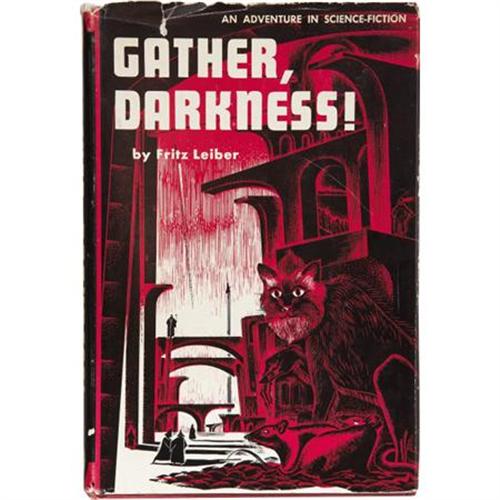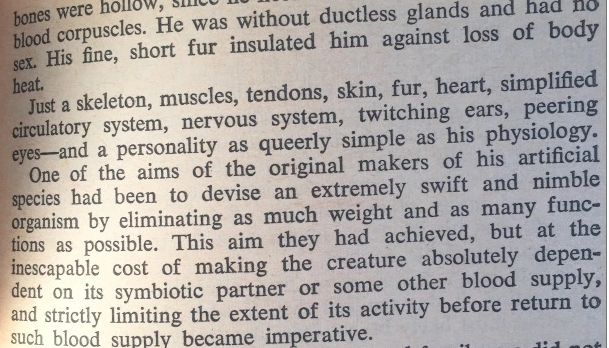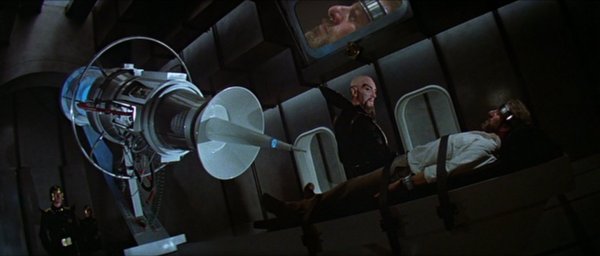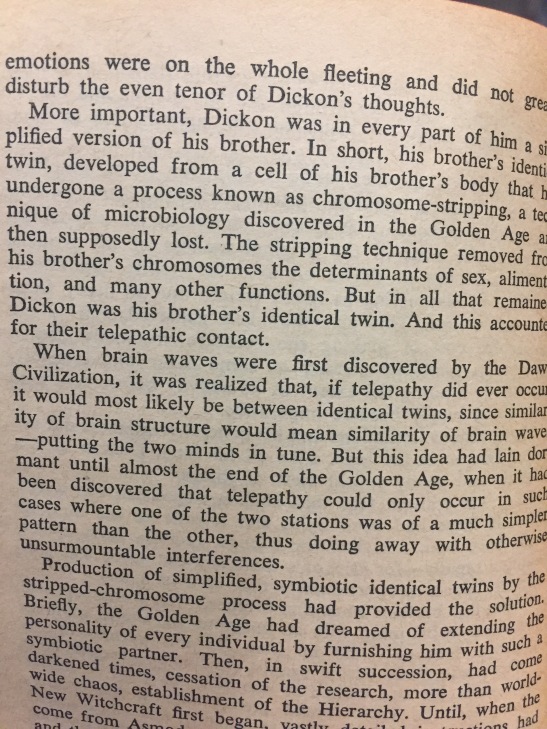
Gather, Darkness!, my first Leiber book, and the perfect example of a story I can simultaneously dislike and credit with having some solid writing and interesting ideas.
Set in a distant future that has seen the collapse of society and subsequent rebuilding into a Medieval facade, Gather, Darkness! tells a bleak, subversive, and rather cynical story. The Hierarchy, an evil, futuristic version of the Church, rules over the masses using a false religion as a means of control. The common folk toil endlessly to support the often luxurious lifestyle of the priest lords and their lieutenants, the deacons, who see themselves as providing order and stability and preventing society from spiraling downward into oblivion once again. It’s all a big con, though. Miracles abound, but are in reality nothing more than scientific devices and applications beyond the ken of the peons. Newly inducted priests are slowly taught that there is no Great God; it’s all a farce.
So on the one hand, we have an evil stand-in for the Catholic Church. On the other, we have the Witchcraft, an underground resistance, of sorts. Except they employ the same tactics as the Hierarchy, disguising their technology and weapons as magic. Satanic magic. That’s right, the “good guys” in this book profess to worship Sathanas, the futuristic devil. Their leader, shrouded in secrecy, takes the name Asmodeus. Their goal – to topple the priesthood and ultimately reveal that both God and the Devil are fictions, and to education and elevate the populace once again.
Aside from carrying some rather subversive messages (which is nothing new now, though in 1943 this may have been quite revolutionary), there are some politics and quite a bit of intrigue within the two main factions. Unfortunately the setting is the real main character here, and not in a good way. The players in the story – chiefly Armon Jarles, the Black Man, Sharlson Naurya, and Goniface, are rather shallow and largely uninteresting. They serve to carry the plot forward, but are one-dimensional the mostly unsympathetic.
Leiber did craft some cool, noteworthy scifi ideas: “angels,” which were basically flying mech suits, “wrath rays,” which were disintegration beams, and a scientifictional take on the concept of the witch’s familiar.
Classically, familiars were minor spirits or demons that took the form of animals (most famously the black cat) and served witches and warlocks. In Gather, Darkness!, the characters explain that familiars supped upon the blood of their masters for sustenance – a kind of symbiotic deal. In the story’s reality, however, familiars were scientific creations like all other forms of magic; the result of genetic manipulation and cloning.
The explanation for the telepathic link between the master and familiar was a little strained, but the rest of it was an interesting take on the concept. Particularly the biological parts.

There were also a couple of scenes that reminded me of a part from the 1980 Flash Gordon movie. In the book, there’s a nefarious priest tasked with reprogramming particularly problematic priests or persons who may be useful to the Hierarchy. When he goes to work on Armon Jarles, Jarles tries clinging to his ideals and memories as they’re pulled from his mental grasp. Later on, the Black Man hits upon a more effective defense in taking the opposite approach – emptying his mind. Incidentally in Flash Gordon, Zarkov was able to resist being brainwashed by focusing on song lyrics. Groovy.

Gather, Darkness! possessed some elements that I’m sure must have been innovative for their time, and some ideas that even now struck me as original and praiseworthy.
On the whole, though, the story fell flat. The transparent critique of religion and the Church specifically, along with a lack of any real, likable hero just isn’t my cup of tea. The plot of the story is decent enough, but it’s not very uplifting. Sure, the good guys win eventually, but to what end? If there is no God and no moral law, who determines what is good, what is just? The erstwhile forces of darkness, worshipers of fake-Satan? The Black Man even says at the end that there is much work to be done, as many of their peers will no doubt want to set up their own ruling government similar to the one they had just overthrown. “Burn it all down” is well and good when you’re toppling an oppressive government, but what comes next? And if the answer is a more egalitarian society, why? Why do all men deserve to be treated equally? Leiber is silent here.
When it comes to Fritz Leiber, I expect I’ll enjoy Fafhrd and the Gray Mouser a lot more than Gather, Darkness! From what I’ve heard, it sounds as if at some point he learned how to write entertaining characters, so I’ll look forward to that.
-Bushi


I think I read one or two Grey mouser books and that was enough for me. Hope your next foray into Leiber works out better for you.
LikeLiked by 1 person
Thanks. We shall see. They seem to be pretty beloved among the App N crowd.
LikeLiked by 1 person
I haven’t read this book by Leiber but I’ve found that the early F&GM stories (as in publication order, not story chronology as they’re often reprinted now) are much better than the later ones. The older ones are just good adventure stories with some dark and creepy parts. Leiber seemed to get bored with the series later and turned to joking and including some skeevy S&M stuff, as I recall.
I liked Leiber’s Conjure Wife okay.
LikeLiked by 1 person
Word! I will check some of that out. Thanks Andy.
LikeLike
I agree with Andy: the F&GM I liked best were the early ones, Swords Against Death and Swords Against Deviltry. Swords against Death is the expanded version of Two Sought Adventure, the first collection of their stories and IMO, the best. I suggest reading that one first; if it isn’t to your taste, give the others a pass.
LikeLiked by 1 person
Gotcha. I picked up a copy of the second one already…still need to get my hands on the first.
LikeLike